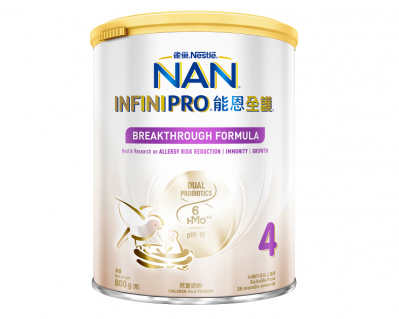Infants fed on novel milk formula have BMI, blood pressure similar to breastfed infants – Danone-funded five-year study

In addition, the BMI and blood pressure of infants who were fed on the novel formula, were consistently lower than infants who were fed with the control formula – a conventional, small lipid droplets formula.
The study was conducted in four countries, namely Singapore, France, the Netherlands, and Belgium, with findings published in The American Journal of Clinical Nutrition.
Blood pressure and BMI were areas of interest as existing studies showed that milk formula-fed infants tend to grow up with a higher BMI and blood pressure in their teens and adulthood.
The novel milk formula trademarked Nuturis, on the other hand, has been shown to alter the infants’ physiologic response to infant milk formula, such as altering their digestion and lipid metabolism.
According to Danone, Nuturis was developed to closely mimic the structure, size, and composition of lipid globules found in human breast milk, with large milk phospholipid droplets measuring diameter of three to five micrometres.
Existing findings showed that it is safe and well-tolerated.
In this study, 311 infants were randomised to take either Nuturis or the conventional infant milk formula until they turned four months old.
Another 88 breastfed infants were included to serve as reference.
The researchers then followed up on the infants’ growth and development until they turned five years old.
During this period, their height, weight, BMI, and head circumference etc, were collected when they were one, three, four, and five years old. Their blood pressure was also taken, but only at the last visit.
Only three countries participated in the follow-up study, namely Singapore, the Netherlands, and Belgium and a total of 237 infants completed the last visit.
Lower BMI
Babies fed on Nuturis had consistently lower mean BMI values during the follow-up period as compared to the control group.
For example, at one year old, the BMI for the concept group was 16.68, similar to 16.67 for the breastfed group, while that of the control group was 17.41.
On the other hand, the incidence of early infancy rapid weight gain between baseline and four months of age – which is a risk factor for childhood overweight and adverse metabolic outcomes, was highest in the control group at 28.8 per cent, 23.3 per cent in the Nuturis group, and 20.3 per cent for the breastfed group.
“Interestingly, although the BMI-for-age z-score increased from baseline to 12 mo of age in both formula groups, the estimated mean increase for the Concept [Nuturis] was markedly smaller than the Control group.
“Moreover, compared to the breastfed group, the mean BMI-for-age z-score change from baseline to 12 mo of age was higher in the Control group. Contrary, the mean BMI-for-age z-score change from baseline to 12 mo of age in the Concept group was close to that in the breastfed group,” said the researchers.
Effects on infants with overweight mothers
Interestingly, in offspring from mothers with overweight or obesity, a substantially lower mean BMI-for-age z-score was observed in the Nuturis group as compared to the control group.
In contrast, in offspring from mothers with a normal weight or underweight, only a markedly lower mean BMI-for-age z- score in the Concept group was observed at 12 mo of age but not at later time points.
Lower blood pressure
By the end of the study, the Nuturis group had a lower mean diastolic and arterial blood pressure as compared to the control group.
For example, the mean diastolic blood pressure was lower in the Nuturis group than the control group by 4.3 mm Hg.
Their mean systolic blood pressure was also lower than the control group, but the difference was not statistically significant.
In addition, as compared to the breastfed group, the mean blood pressure parameters were lower in the Nuturis group.
Nonetheless, subjects with elevated blood pressure or hypertension were identified across all three study groups – nine from the Nuturis group, 17 from the control group, and 14 in breastfed group.
In the Nuturis group, the prevalence of elevated blood pressure, including hypertension, also tended to be lower than in the control group and in the breastfed group.
Source: The American Journal of Clinical Nutrition
Infant Milk Formula with Large, Milk Phospholipid-coated Lipid Droplets Enriched in Dairy Lipids Affects Body Mass Index Trajectories and Blood Pressure at School Age: Follow-up of a Randomized Controlled Trial
https://doi.org/10.1016/j.ajcnut.2023.10.017.
Authors: Marieke Abrahamse-Berkeveld et al

















